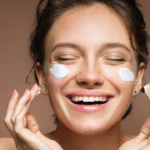Aging is inevitable, but how we age is partly within our control. Building a solid anti-aging skincare routine is essential for maintaining youthful, radiant skin over time. This guide will help you understand the steps, ingredients, and techniques required to develop an effective routine to combat fine lines, wrinkles, and age spots.
Understanding Skin Aging

What Causes Skin Aging?
Skin aging is caused by both intrinsic (natural aging) and extrinsic (external factors) processes. Key contributors include:
- Collagen Breakdown: Reduced collagen leads to wrinkles and sagging.
- Loss of Elasticity: Elastin fibers degrade, leading to less firm skin.
- Environmental Stressors: UV radiation, pollution, and toxins accelerate skin aging.
- Lifestyle Factors: Smoking, poor diet, lack of sleep, and stress damage skin over time.
Key Ingredients in Anti-Aging Skincare
1. Retinoids (Retinol, Tretinoin)
- Boost collagen production.
- Improve cell turnover.
- Reduce fine lines and pigmentation.
2. Vitamin C (Ascorbic Acid)
- Powerful antioxidant.
- Brightens complexion.
- Reduces hyperpigmentation.
3. Hyaluronic Acid
- Hydrates and plumps the skin.
- Improves skin elasticity.
4. Peptides
- Signal skin to produce collagen.
- Strengthen skin barrier.
5. Sunscreen (SPF 30 or higher)
- Protects against UV damage.
- Prevents photoaging and pigmentation.
6. Niacinamide
- Improves skin tone.
- Reduces redness and fine lines.
Step-By-Step Anti-Aging Skincare Routine

Morning Routine
Step 1: Gentle Cleanser
Use a non-stripping cleanser to remove overnight oils without damaging the skin barrier.
Step 2: Antioxidant Serum (Vitamin C)
Apply a Vitamin C serum to fight oxidative stress and brighten your complexion.
Step 3: Hydrating Serum (Hyaluronic Acid)
Layer a hyaluronic acid serum to lock in moisture.
Step 4: Moisturizer
Choose a lightweight moisturizer enriched with ceramides or peptides.
Step 5: Sunscreen (Broad Spectrum SPF 30+)
Sunscreen is non-negotiable. Apply generously to all exposed areas.
Night Routine
Step 1: Makeup Removal / Cleanser
Use a gentle oil-based cleanser to remove makeup and SPF, followed by a water-based cleanser.
Step 2: Exfoliation (2-3 Times Weekly)
Use a chemical exfoliant (AHA/BHA) to remove dead skin cells, promoting smoother skin.
Step 3: Retinoid
Apply a retinoid cream or serum to stimulate collagen production. Beginners should start slowly to prevent irritation.
Step 4: Hydrating / Peptide Serum
Hydrate your skin and support repair with a peptide-rich serum.
Step 5: Rich Moisturizer
Seal your routine with a nourishing moisturizer to lock in actives and moisture.
Weekly Additions
Face Masks
Use hydrating or anti-aging masks once or twice weekly to boost skin health.
Facial Oils
Apply oils rich in antioxidants, like rosehip or argan oil, to deeply nourish the skin.
Lifestyle Tips To Complement Skincare
- Stay Hydrated: Drink at least 8 glasses of water daily.
- Balanced Diet: Incorporate fruits, vegetables, lean protein, and healthy fats.
- Sleep: Aim for 7-9 hours of quality sleep.
- Manage Stress: Practice mindfulness or yoga.
- Avoid Smoking & Excessive Alcohol: Both accelerate skin aging.
Mistakes To Avoid in Anti-Aging Skincare
- Skipping Sunscreen: Negates all anti-aging efforts.
- Over-Exfoliation: Leads to skin irritation and barrier damage.
- Using Too Many Actives at Once: Causes irritation.
- Neglecting Neck and Hands: These areas also show signs of aging early.
Customizing Your Anti-Aging Routine
Each skin type requires a tailored approach:
- Dry Skin: Focus on hydration and barrier repair.
- Oily Skin: Use oil-free, non-comedogenic products.
- Sensitive Skin: Introduce actives slowly and use fragrance-free formulas.
- Combination Skin: Balance hydration with oil control.
When To Start An Anti-Aging Skincare Routine

While collagen production slows from the mid-20s, it’s never too late to start. Prevention is key, so the earlier you adopt good habits, the better the long-term outcomes.
How Long To See Results?
- Immediate Hydration: Within days.
- Texture Improvements: 4-6 weeks.
- Reduction in Fine Lines: 3-6 months.
- Consistent Application: Is critical for sustainable results.
Also Read : Budget To Luxury: Best Skincare Products That Are Worth It
Conclusion
Building an effective anti-aging skincare routine requires consistency, patience, and the right combination of ingredients. Focus on protection (sunscreen), repair (retinoids, peptides), and hydration (hyaluronic acid). Support your routine with a healthy lifestyle to maximize skin health from within. Aging gracefully is a journey, but with the right care, your skin can look radiant at every stage of life.
Frequently Asked Questions (FAQs)
Q1. Can I use retinol every night?
If you’re a beginner, start 2-3 times a week and gradually increase to nightly use as your skin builds tolerance.
Q2. Is sunscreen necessary indoors?
Yes. UVA rays penetrate windows, so daily sunscreen is essential, even indoors.
Q3. Which is better: retinol or vitamin C?
Both are essential for different reasons—retinol for collagen stimulation and vitamin C for antioxidant protection. They can be used together, usually Vitamin C in the morning and retinol at night.
Q4. How do I avoid irritation from retinoids?
- Start slow.
- Use a buffer (apply over moisturizer).
- Choose a low concentration initially.
Q5. Are expensive products better?
Not necessarily. Focus on ingredients, not brand prices. Affordable products with proven actives work well.
Q6. When should I start anti-aging skincare?
Mid-20s is ideal for prevention, but it’s beneficial at any age.
Q7. Should I apply products to the neck?
Yes, your neck shows aging signs early. Extend skincare to your neck and décolleté.
Q8. How much sunscreen should I apply?
Use about 1/4 teaspoon for the face and neck, and reapply every 2 hours when exposed to sunlight.
Q9. Are natural oils effective for anti-aging?
Yes. Oils like rosehip, argan, and jojoba nourish skin but should complement—not replace—actives like retinol or peptides.
Q10. Can I skip moisturizer if I have oily skin?
No. Even oily skin needs hydration. Use a lightweight, non-comedogenic moisturizer.




